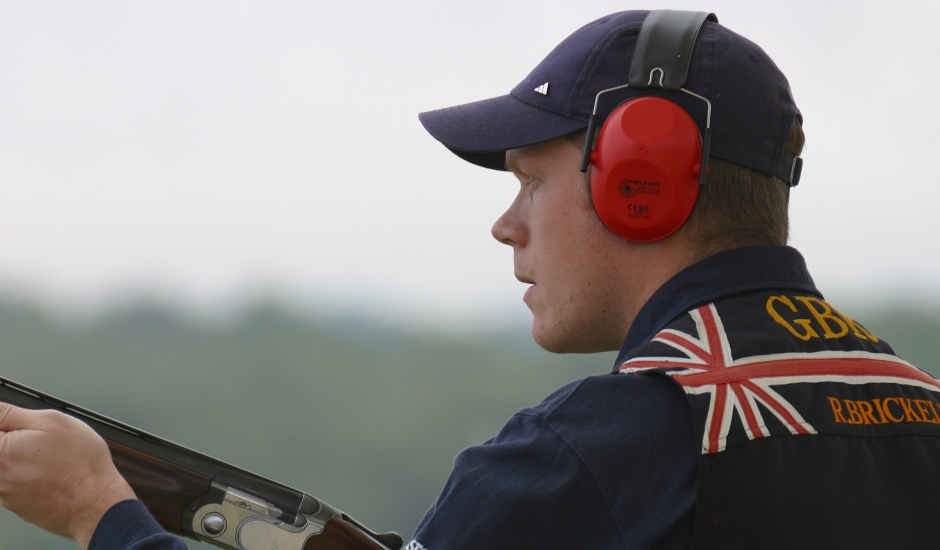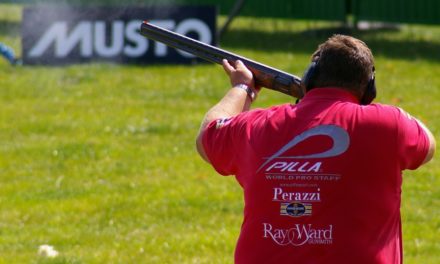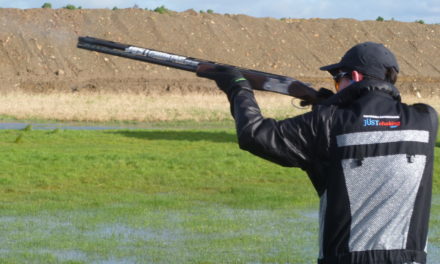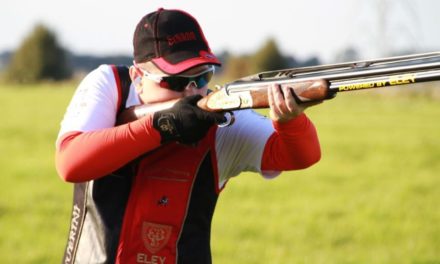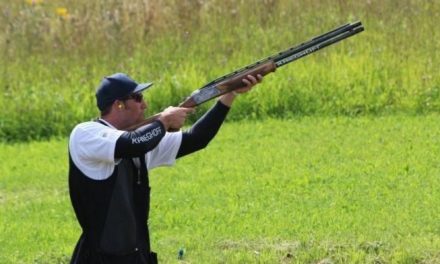Richard Brickell is the current Commonwealth Gold Medal Holder for Skeet (scoring 144 in India), and has previously represented Great Britain at the 2004 Olympics in Athens. Now, he’ll be one of the leading hopes in the British Shooting team for London 2012 after qualifying to represent his country again in the Skeet event.
ShootClay : Firstly – thank you Richard for spending some time with ShootClay – I know that our readers will be interested to learn about how you are preparing for next year’s games – and some background to your shooting career. To start, let’s go back to the beginning – how did you start shooting and how old were you when you first broke a clay? Did you immediately get the bug?
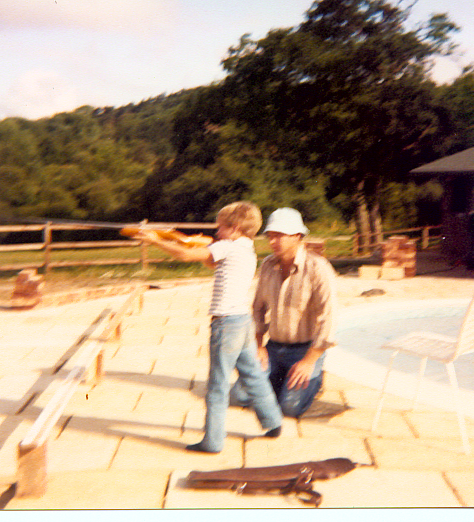 Richard Brickell : My father is a keen clay shooter and he introduced me to the sport when I was 8 years old. My father was also an enthusiastic rough shooter and I remember first being taught gun safety in the field before I even fired a shot. My first gun was a bolt-action .410 and I was hooked on the sport instantly. I recall practising mounting the gun every day and weightlifting with a house brick to improve my strength so that I could swing the gun better.
Richard Brickell : My father is a keen clay shooter and he introduced me to the sport when I was 8 years old. My father was also an enthusiastic rough shooter and I remember first being taught gun safety in the field before I even fired a shot. My first gun was a bolt-action .410 and I was hooked on the sport instantly. I recall practising mounting the gun every day and weightlifting with a house brick to improve my strength so that I could swing the gun better.
SC : What drew you to the Skeet discipline in particular? Do you shoot any other disciplines?
RB : For the first four years I shot all disciplines but at the age of 12, the lure of the Olympics attracted me to Olympic Skeet. I enjoyed the test of speed and co-ordination that the discipline demands and my mind was made up from very early on, that Olympic Skeet was the event for me.
SC : Where do you currently train? Who is your Coach?
RB : As there was a lack of Olympic Skeet ranges near to where I live, I was fortunate that my Uncle who is a farmer, allowed me to build my own range on his land. This was a huge step forward and enabled me to train on a frequent basis. My coach since the age of 13 is Joe Neville. Joe’s shooting ground is based in Derbyshire, and I have travelled the 260 mile round trip to train with him as often as I can since the age of 13. Andrew Austin, an Olympian at the Barcelona Games, has also been a huge help over the last 10-15 years.
SC: George Digweed told us that when he wants to brush up his skills, he goes out and shoots some Skeet – it gives him a chance to revise the angles and trajectories – how do you train? Is it 100% skeet – or do you have any other training routines?
RB : I believe that George shot a lot of Skeet in the early years before dominating in Sporting. Skeet teaches good mounting of the gun and overall technique. I advise any new shot to start on skeet before considering the other disciplines, in order to learn the basic technique of shooting.
To be successful at the highest level, I have to dedicate myself 100% to the skeet discipline. When not shooting, I have a physical training programme and also try to fit in full-time employment!
SC : You secured your place in the Mens Skeet for London 2012 with a 6th place in Sydney on 147ex150 – can you tell us a little about that final, it sounded like a close run affair.
RB : As with all sports, the standard of shooting in the skeet event has increased. My score of 147 ex 150 would have been good enough to win a World Cup event a few years ago.
Going into the final, I was very pleased to have shot my personal best score at an international event – another huge bonus was the knowledge that I already secured the Olympic quota spot before shooting the final.
The final consisted of some very strong shooters, including the current World Champion, the ex World & European Champion and the current Olympic silver medallist. It was great to be shooting off against the best in the world and it would have been fantastic to come away with a medal. I came away feeling very happy with my performance, and together with the Commonwealth Games Gold Medal a few months earlier, this represented a great start to the year for me and the realisation that I have the ability to beat the best.
SC : What does your quota place mean for your preparations now? How has the process been so far? Which competitions will we see you competing in as we run-up to London?
RB : Despite winning the quota place, my selection for the London Olympics is not guaranteed. Since the Sydney World Cup in March, my objective has been to maintain my form and prove that I am the person to fill the place for GB. I have since had a very pleasing result at the European Championships where I shot 123 ex 125. The last competition this year will be the World Championships in Belgrade where I hope to maintain my international form. The quota place that I won together with the automatic place for being the host nation means that we will have two shooters in the men’s skeet event at the London Olympics which is fantastic news for our sport.
SC : How do you feel that the shooting sports are being represented at London 2012? Have you seen anything of the venue being built at Woolwich?
RB : I think shooting sports are always presented with a challenge with regard to their image in the public eye. We have some very smart people involved in running our sport and they couldn’t wish for a better stage than hosting an Olympic Games to promote everything that is great about our sport. I have not seen any of the construction work yet, but I have heard that the Olympic Village is superb.
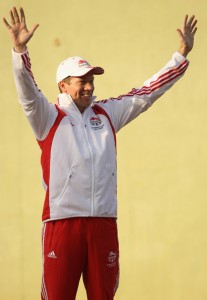 SC: How do you prepare for a big competition? Will you be at a training camp for London 2012?
SC: How do you prepare for a big competition? Will you be at a training camp for London 2012?
RB : I like to feel I am in good physical shape prior to a big event. This is not just to help deal with the likely heat and general fatigue often experienced overseas but it also boosts my confidence to know that I am in a good state of fitness prior to the competition. I don’t think you need to be super fit to shoot well, but fit for the purpose of competing for long days in the heat. To perform well at an event, I need to be shooting very instinctively and like to trust my natural ability. I therefore build up to any competition in the same way by keeping my approach simple and avoid becoming to mechanical. When you get to the competition, it is too late to be thinking about your technique!
After the World Championships in September, we will start the planning for next year which is likely to include training camps and World Cups in the Spring.
SC : Can you give us some insight into the British Team? How is morale ahead of our home Olympics? Is everyone excited?
RB : We are less than a year away now and you can’t help to be excited about the Games. For some it will be their first Olympic Games and I can guarantee they will have the experience of a lifetime, after all, the Olympic Games has to be the pinnacle for any sports enthusiast. There have been some fantastic results this year by the British double trap shooters, with both Richard Faulds and Peter Wilson having won World Cups. Success like this is great for team morale and has the habit of having the knock on effect with the other disciplines, we saw that with the Commonwealth Games in Delhi.
SC : A lot of ShootClay readers are interested in the kit you use – can you tell us about your set-up, and which sponsors look after you?
RB : I shoot a Beretta 682 28″ skeet gun with a customised stock. Having shot with it for a long time the gun itself is getting tired, but I am a firm believer in sticking with the tools that work. I am fortunate that Beretta/GMK have supported me since 2003 and Hull Cartridge support me with the supply of Pro One 24g 9’s cartridges.
SC : What is your pre-shot routine? How do you stay focused for a full round Olympic Skeet? Do you have any superstitions?
RB : I have a very simple pre-shot routine, I believe it has to be simple in order to shoot a big score. I generally focus on what is probably most important which is to “properly” look at the clay! This can sometimes get forgotten if you are distracted by hold points or other technical aspects. You can often make an error in the mount but if you focus on looking hard at the clay you should still hit it. I used to be superstitious but gave up when it my superstitions didn’t work every time. I do however try to stick to the same pre-round and shot routine whenever possible.
SC : Finally – one last question – if you could choose your ideal shooting squad (dead or alive), who would you choose?
- No. 1 – My Father Brian – If it wasn’t for him I would not have achieved what I have.
- No. 2 – My Wife Kate – As I wouldn’t be able to focus on my shooting without her support and particularly looking after Oliver my 14 month old son whilst I am training and shooting competitions.
- No. 3 – Joe Neville – Coached me for over 20 years now, and is regarded as one of the best coaches in the World. He could shoot a bit in his day too.
- No. 4 – Matt Dryke (USA – Olympic Champion 1984) – I started shooting too late to have the pleasure of seeing Matt shoot but he is regarded as one of the greatest skeet shots.
- No. 5 – Vincent Hancock (USA – Current Olympic Champion) – Huge talent from the USA. A fierce competitor and although not often, the one shot I have been most pleased to beat!
- No. 6 – Axel Wegner (GER – 1988 Olympic Champion) – Very influential during my early years as I admired his technique, one of the best. Still competes today.
I would like to be the 7th man and my button pusher would be my son Oliver as he should learn a bit about how to shoot well.
SC : Richard – Thanks for talking to ShootClay, we’ll be right behind you as you represent British Shooting at London 2012. We wish you good luck in your preparations and at the main event

